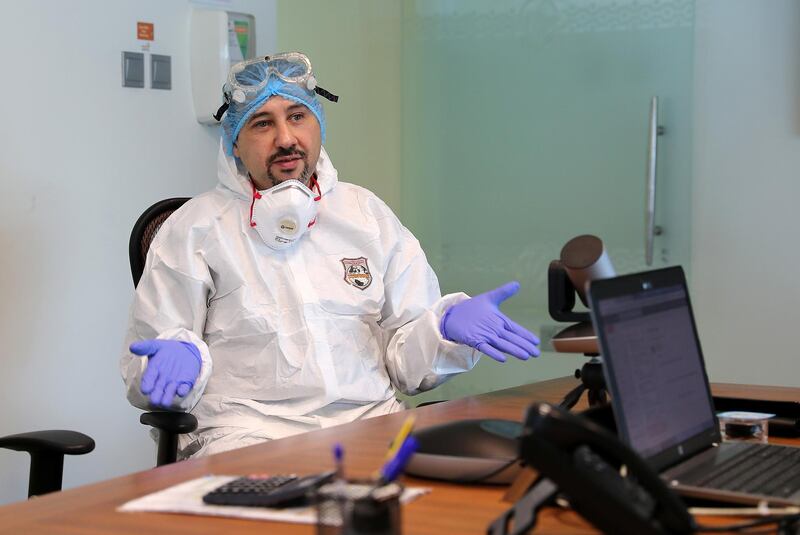Obese coronavirus patients are more likely to die from resulting complications than those maintaining a healthy weight, scientists have found.
Early stage research by a consortium of UK doctors and scientists looked at the effect of Covid-19 on almost 17,000 hospital patients at 166 hospitals.
The Coronavirus Clinical Characterisation Consortium found that death rates among obese patients, with a body mass index over 30, were 37 per cent higher than those for patients at a healthy weight.
The study did not disclose how many of the 16,749 patients were obese but said almost 75 per cent of coronavirus patients in intensive care are overweight, while people of a healthy weight only make up a minority.
Comparative figures are not available in the UAE but frontline doctors in Emirates said they also found that most overweight patients suffered more from Covid-19.
“If these patients get any critical illness it is a big challenge to manage them clinically,” said Dr Adel Al Sisi, medical director at Prime Hospital In Garhoud, where more than 100 patients have been treated since March.
“Obese patients often have a shorter neck which makes it difficult to insert a trachea tube into their airway if they need ventilation.
“Diagnostic imaging is also harder as the machines have a weight limit.
“Generally, these patients are harder to move around the hospital because of their size.”
Breathing problems and reduced lung function, common in overweight people, is considered a major factor in higher death rates in those with coronavirus.
University of Oxford scientists said patients with a larger stomach had a reduced lung capacity when lying down as the extra weight pushed the diaphragm upward making it harder to breathe.
Dr Al Sisi referenced a recent case of an Emirati man weighing 118 kilograms with a BMI of 40 who spent 17 days on a ventilator in the intensive care unit at Prime Hospital.
The patient was diagnosed with Covid-19 and also obstructive sleep apnoea that caused further breathing difficulties.
He is now recovering on a ward after spending longer in ICU than patients with a healthy weight.
Figures from the UK’s Intensive Care National Audit and Research Centre supports the theory that obese patients are more likely to be hit hard by the virus.
Morbidly obese patients in intensive care, as a result of Covid-19, are double the number seen in the UK’s general population.
Medics in the US have recorded similar findings, where young obese patients with no other existing ailments have fallen seriously ill after contracting the virus.
“Obese patients seem to suffer more from complications of Covid-19 and are more likely to require intensive care if infected,” said Dr Amal Upadhyay, a gastroenterologist at Aster Hospital in Mankhool.
“Considering the prevalence of overweight people and obesity in the UAE, a large segment of the population is likely to be vulnerable.”
A 2018 online health assessment by Oman Insurance Company of 3,000 UAE residents found as many as 62 per cent were overweight.
“Unfortunately, obesity is more common among younger people in this region,” Dr Upadhyay said.
“While the elderly are more likely to fall sick with coronavirus, in this part of the world the epidemiology may differ so we may encounter even young people at risk from the virus.
“This is important from a point of view of the prevention and precautions we should take.”
Further research by the University of North Carolina in the US has suggested once a vaccine is found, obese people may not respond as well as those with a healthy weight.
The 2017 study found 10 per cent of morbidly obese people developed seasonal flu despite being vaccinated compared with just five per cent of those with a healthy weight.
Doctors said the body’s T cells that play a vital role in its immune system could be impaired in the obese.
A BMI reading is made by dividing your weight in kilograms by your height in metres squared, with anything over 24.9 considered overweight and a reading above 30 obese.
Dr Basil Ammori, a bariatric surgeon at Burjeel Hospital Abu Dhabi, said the impact on the obese is similar to what was recorded during previous pandemics.
“Obesity was similarly identified as an independent risk factor for higher rates of complications, ICU admissions and death during the 2009 H1N1 swine flu pandemic,” he said.
“This rings alarm bells for obese people in the UAE as well as for healthcare providers.”
Dr Ammori said another factor to consider is the consequences of impaired immunity in obese people and how they respond to viral infections.
“We know obese adults infected with flu shed the virus for a longer time compared to the non-obese,” he said.
“If similar observations are made with the coronavirus, this might necessitate longer periods of quarantine.
“In general those overweight and in poor health are slow to develop antibodies to a viral infection, experience poor recovery and are less likely to respond to of antivirals and vaccines.”







